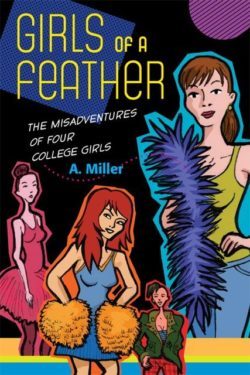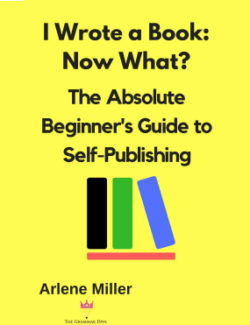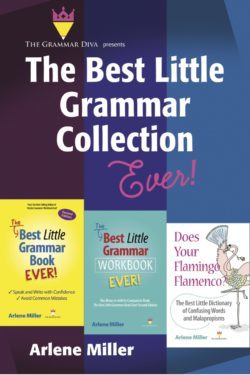Arlene Miller's Blog, page 41
March 14, 2018
You Are Invited to My Book Launch
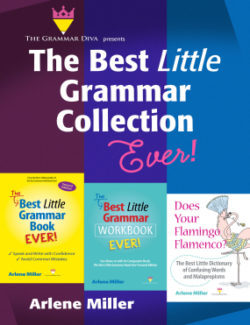 I know many of you live far away, even in other countries. But I thought I would send out this final reminder for my book launch this coming Friday evening — in case you live locally enough to attend.
I know many of you live far away, even in other countries. But I thought I would send out this final reminder for my book launch this coming Friday evening — in case you live locally enough to attend.
What? Book launch of The Best Little Grammar Collection Ever!
Where: Copperfield’s Bookstore, 140 Kentucky Street, Petaluma, California
When: Friday March 16 at 7 p.m.
Why? Support of your local independent bookstore; cupcakes; prizes; and an interesting talk about grammar, words, and language
Here is the link.
March 9, 2018
A Little Bit About Voice
 Verbs are probably the most exciting part of speech because they have various qualities that other parts of speech wouldn’t dare to dream about having. Verbs have tense, verbs have mood, verbs can be either transitive or intransitive — and verbs have voice.
Verbs are probably the most exciting part of speech because they have various qualities that other parts of speech wouldn’t dare to dream about having. Verbs have tense, verbs have mood, verbs can be either transitive or intransitive — and verbs have voice.
There are two verb voices: active and passive. And it all depends on how you use the verb in a sentence.
If the subject of the verb is actually performing the action of the verb, we call it active voice:
Jane drove the car to school.
He threw the ball.
The thief ran off with a bag of jewelry.
If the subject of the verb is not performing the action of the verb, we call it passive voice:
Jane was driven to school. Jane is still the subject, but she didn’t do the driving, so we have passive voice. Sometimes the doer is mentioned in the sentence: Jane was driven to school by her brother. Brother still isn’t the subject; it is the object of the preposition by. Jane’s brother drove her to school is in the active voice.
The ball was thrown. Ball is the subject, but the ball didn’t do anything, so this is also an example of passive voice.
The jewelry store was robbed. The store didn’t do anything, so this is another example of passive voice.
The general rule is to write using active voice most of the time. It is — well — more active, and that is a good thing.
However, there are times when you either want or need to write in the passive voice:
You don’t know who did it.
You don’t care who did it.
You neither know nor care who did it.
The school was built in 1970. Passive voice because you probably don’t really care who built it. You may not know either.
She was awarded the title of Miss Apple Blossom. The important thing is that she was given the title. We probably don’t care who gave it to her.
That song was first released in 1995. In this case we might really care who first sang that hit song, but we can’t remember. Of course, nowadays, you can find anything out by just “googling it.”
I remember once when I was a newspaper reporter (way back before the internet) that I once did not get the name of the perpetrator of some story. The only solution — if I really could not have found out with my tight deadline — was to write the lead in the passive voice.
We tend to speak and write in the passive voice when we are not emphasizing who did it — when the important thing is that it was done. Here are sentences that fare well in the passive, whether or not we know who did it.
I was given an award for my math skills in 6th grade. (It is important that I got the award, not who gave it to me.)
The cake was decorated incorrectly when I picked it up from the bakery. (We don’t really care who decorated it.)
He was elected President in 1990. (It is obvious who elected the President, so we don’t need to say it.
On the other hand, it is possible that the doer in those sentences matters a lot — so much that you want to use active voice:
President Clinton gave me an award for my math skills in 6th grade. (emphasizes who gave the award as the important thing)
My cousin, who is the chief baker at the grocery store, put the wrong names on the wedding cake! (emphasizes who made the mistake)
The new Liberty Party elected him President in 1990.(emphasizes that it was a new party that was instrumental in electing the President — we aren’t talking about the United States, of course!)
We do tend to instinctively use the voices in the best way. However, sometimes a writer will overuse the possessive, which usually makes the writing wordy:
TOO MUCH PASSIVE – She was given a huge birthday cake by her mother, who had spent all day baking and decorating. Then when the cake was gone she moved over to open the mountain of gifts that were given to her by her big family. A fun time was had by all!
REWRITE – Her mother gave her a huge birthday cake after spending all day baking and decorating. After everyone was done eating cake, she opened the mountain of gifts her huge family had given her. A fun time was had by all OR Everyone had a fun time.
Save The Date! Friday, March 16 at 7 p.m. – Petaluma Copperfield’s Books
The Book Launch: There will be cake and friends and fun – an entertaining talk about the English language. Be there!
The Novel: Coming out March 17 (of thereabouts) to Amazon, Kindle, as well as all other online print book and e-book retailers. An entertaining beach (or pre-beach) read!
“A fun, quirky read, strictly for entertainment, it tells the often crazy-sounding year of four freshmen college girls through the eyes of the protagonist, Kate. How could a story turn out any more bizarre?”
— R. Moore, YA author
“Girls of a Feather is a thoroughly entertaining read, with an unexpected twist at the end! I stayed up way too late reading each night because ‘just one more chapter’ wasn’t enough. A great way to escape from the boredom of everyday life!”
— D. Miller, happy reader
March 2, 2018
March 4 Is National Grammar Day! Let’s Celebrate!
March 4 is National Grammar Day. It was designated in 2008 by Martha Brockenbrough, founder of the Society for the Promotion of Good Grammar.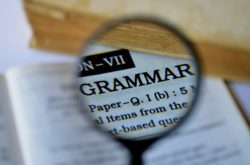
According to Global Language Monitor, the estimated number of words in the English language is over a million — 1,025,109, to be exact, but there is some controversy over that exact figure. However, it’s safe to say it is over a million. Language is something to celebrate. Some people think that grammar is just a boring set of rules for language, but it is more than that: it is a system for understanding language. And understanding this system and structure helps us to communicate better and even learn new languages more easily.
So….to celebrate National Grammar Day 2018, here is a fun quiz, the answers to which are grammar terms — so it’s not a quiz about the rules. The answer to each of the following 20 questions is something you might find in a glossary of grammar terms (so, hint, hint, don’t look at the glossary that is at the back of some of my books). You will find the answers if you scroll way, way down.
Here we go….
A pronoun takes the place of a noun or another pronoun somewhere in the sentence. What is that noun or other pronoun called in relationship to the pronoun?
A, an, and the are called what?
There are two of them when referring to a quality of verbs: active and passive. What is this quality that verbs possess?
A group of words that contains a subject and a verb (and might or might not be a complete sentence) is called what?
There is a special term for nouns like these: bunch, group, team, herd, class. What is that term?
There are five of them in Latin and even more in German and other languages. English has three. They are nominative, objective, possessive. What are they?
A verb that is being used as an adjective (and usually ends in -ing or -ed) is called a what?
What are these called? in a box, out the door, above the tree, under the table
I like pizza. Pizza is a noun. What function does it have in that sentence?
Which tense is the verb in this sentence an example of? I have read that book twice.
I am going to the movies is a simple sentence. What is this one called? I am going to the movies, and I am meeting my friends afterwards.
If you want to connect two sentences that are closely related, and you don’t want to use a period or a conjunction, what punctuation might you use?
What is this called? I think you will like that movie, I certainly did.
The little line that is used for the minus sign and to indicate a range of numbers in an index is called what?
A verb with an -ing ending is sometimes used as a noun. What is that called?
I am smarter than you contains a comparative adjective. What does this sentence contain? I am the smartest person in the room.
I don’t have barely enough money to pay my bills. What grammar mistake does that sentence contain?
Mary, my partner in crime, is my second cousin. What is my partner in crime called in that sentence?
What part of speech are these words? Oh my! Gee! Darn!
Most verbs form the past tense by adding –ed ( played, walked ), but many don’t. What are the ones that don’t called? (for example, ran, swam, threw , etc.)
That might have been fairly difficult unless you are a real grammar lover or an English teacher! Scroll down for the answers.
Don’t forget about the big event on March 16 at 7 p.m. at Copperfield’s books! The launch you don’t want to miss. Why?
There will be cake, your friends will be there, Copperfield’s is a great bookstore, and it’s FREE!
(Keep scrolling for the answers.)
My novel will be coming out very soon with a new title and my real name! Great beach read! Or bedtime read! (If you read Trashy Novel, you’ve already read it!)
(Keep scrolling for the answers.)
HAPPY NATIONAL GRAMMAR DAY!!!!
Here are the answers:
Antecedent
Articles (they are also adjectives)
Voice
Clause
Collective Nouns
Cases
Participle
Prepositional Phrases
Direct Object
Present Perfect
Compound Sentence
Semicolon (in some cases, you could use a Colon)
Run-on Sentence
En Dash (The hyphen is the short one in compound words, and the long one is the em dash, used to indicate interruption in thought in a sentence.)
Gerund
Superlative adjective
Double Negative
Appositive, or Appositive Phrase
Interjections
Irregular Verbs
February 23, 2018
My Writing Life, Part 2
 As I said in the blog post “My Writing Life” a few weeks ago, a reader once asked me to write a post about how I got into writing (and writing about grammar, I suspect) and publishing. In that first post, I talked about my life as a writer, from when I wrote a “musical” when I was about seven to when I decided to write a grammar book . . . at, well, a lot older than seven.
As I said in the blog post “My Writing Life” a few weeks ago, a reader once asked me to write a post about how I got into writing (and writing about grammar, I suspect) and publishing. In that first post, I talked about my life as a writer, from when I wrote a “musical” when I was about seven to when I decided to write a grammar book . . . at, well, a lot older than seven.
Years as a teacher, writer, editor, and long-time grammar lover (Latin was my favorite class in high school) paved the way for writing the books I now write. So, as I said in the previous post, I remember that I was at the gym when I told the woman at the front desk, a novelist herself, that I was going to write a grammar book with all the major problems I saw again and again as an editor and as a teacher.
But where to begin? Do I write? Do I look for a publisher? I honestly cannot remember what I did first, but I do remember looking for a publisher. It was a daunting task. I had a book listing publishers, and there were much too many! And then, I had to locate the ones that would even be interested in a grammar book. As I began to give up that search, I thought about how long it would take traditional publisher to get the book out—maybe a couple of years—and I didn’t want to wait.
I really didn’t know what self-publishing was, but I had heard of it. I had also long heard of vanity publishers, who had been around forever, publishing any book for the right price for any “author” who just wanted to see a book with his or her name on the cover.
I started researching self-publishing with an internet search, of course. It was around 2008 or 2009. I found many companies who called themselves self-publishers. For a certain price—and often a choice of prices depending on what “package” you wanted—these self-publishers would print your book. I began to gather information on a few of them who appeared to be legitimate and not vanity publishers.
My internet search for self-publishers also led me to the Yahoo Self-Publishing Group, now a Facebook group. That group saved my life. I asked them which self-publishing company I should use, and they said, “None!” They recommended publishing the book myself: hiring a cover designer and a page designer and an editor. And I found my first cover designer and my page designer (who is still my page designer to this day) in that group. They also recommended to me a book that separated the legit self-publishing companies (of which there were some) from the vanity presses in disguise.
Yes, there was a learning curve, but things went pretty smoothly. There were some excellent books that took me step by step through everything (and frankly more than everything) I needed to know to self-publish my book. My designers were great! I found out about BAIPA, the Bay Area Independent Publishing Association, which I joined and still belong to. It has been of immeasurable help to me throughout the seven or eight years I have belonged. It is an organization under the umbrella of IBPA, the Independent Book Publishers Association. So if you are interested in self-publishing, you can find out from the IBPA website if there is a similar group to BAIPA in your geographic area. There are many such publishing groups across the country.
So, on May 1, 2010 (or was it May 5?), I launched my first book at my local independent bookstore, Copperfield’s Books in Petaluma,, CA. I still maintain a close relationship with that store and launch all my books there. “Launching” a book is presenting it to the world in an official way. Sometimes a launch consists of a book signing, or maybe signings at several stores. Other times, the launch consists of the author actually talking and making a presentation about the book—and then signing and selling books.
For most independent (self) publishers, bookstores are not the main sales avenue. You can get your books into bookstores, but it can be tough. But it isn’t tough to make your book available for anyone to order at any bookstore. And then there is Amazon and Kindle—along with other online sellers of print books and e-books. It i easy to get your self-published book online.
My first book, The Best Little Grammar Book Ever!, in all its bright yellow splendor, sold quite well for a first book by an independent publisher. I believe the Kindle version made it to about number 5 in rank in grammar books for a while. I was done. I had a book. I mean, how many grammar books can a person write?
It would be a few years after my first book that I would start this blog. But I wasn’t just sitting around. A Facebook friend posted that she had a dream I wrote a book called Correct Me If I’m Wrong. So how could I not? Another grammar book on the way. While similar in content to my first book, I added more comma rules and word usage information, took out the quizzes, and arranged all the issues in alphabetical order. It was quite a different book—and this one was bright green, starting me on the branding idea of a different bright color for each book. And although I switched cover designers at this point, I still maintain a similar cover design for all my books. I have used yellow, orange, green, aqua, white, red, and bright blue now……as well as a second yellow book, a multicolor book (50 Shades of Grammar), and a book with a dark purple background.
How can anyone write so many grammar books? Let me tell you what happened after the first two.
I was teaching 7th grade English until 2015, and after I wrote the first book—and maybe even the second—I was mentoring a student teacher. She thought my grammar lessons were really good and that I should put some of them in a book. Yup! I took yet another suggestion to put out a book. The book became Beyond Worksheets and is an ebook, not a print book. Although it hasn’t done much on Kindle, I have it on a teacher site and it has done quite well, with many really positive responses from teachers who use it.
Soon after, I figured out that people really like workbooks, and I should write a grammar workbook. The big orange Best Grammar Workbook Ever! came out in around 2014. It remains my biggest seller. Schools have discovered it—and the yellow reference book as well.
So is that enough grammar books for one person to write?? Apparently not. I wanted to make an even smaller book than The Best Little Grammar Book Ever! so I came up with The Great Grammar Cheat Sheet, available as an e-book only. It distills only the most common grammar, punctuation, and word usage issues. It is bright red, for those of you keeping track of color.
Is she done yet? Nope! Someone in my writing group (yet another suggestion I took) told me she always printed out my blog posts to keep, and that I should think about putting them in a book. Done, with the clever title Fifty Shades of Grammar. That book came out in 2015 (I think). Just today I was talking with another writer about that book, and I thought, Hey, it might be time for a part 2 of that one. I have lots more posts!
A couple of years ago, I redid my first book, since there was some evolution in grammar, and there is now a second edition of The Best Little Grammar Book Ever! I still had colors yet unused, so I wrote a small workbook to accompany that book—with an aqua cover. I wanted the two sold as a set, but the Print on Demand method that most self-publishers use makes it impossible to sell sets. However, you can combine books under one cover and call it a set. That is what I just did with the second edition of the grammar book and its workbook. But there is also a third book in that collection: Does Your Flamingo Flamenco? So many word pairs are confused that I thought I would write a dictionary-type book with those often confused words: affect/effect, lay/lie, principle/principal . . . . you get the idea. So that book came out on its own, and just recently as the third part of my latest book, The Best Little Grammar Collection Ever!
I recently also wrote an e-book about self-publishing, since I have done it so many times now! And in 2011 I wrote a novel, which has been hanging around on Amazon and Kindle under a pseudonym. I am currently changing the title, changing the author to my real name, and republishing it. I will let you know when it is out (you know I will!)
And we are now at the present! So what are my plans? Well, I have learned that I really like speaking about grammar and words and that I am not at all bad at it (for someone as shy as I have always been). So I speak when I can. I have spoken to many writing groups and community groups. And I do have plans for some books this year:
The next book will likely be a small punctuation-only book.
I plan to write a business writing book this year too (someone’s suggestion).
And I would love to write an English as a Second Language workbook as well. That will take some research!
Then, I may start concentrating on novels!
You can see all my books on the website www.bigwords101.com, also reachable at www.TheGrammarDiva.com. And of course, on Amazon.
SAVE THE DATE!
Friday, March 16 at 7 p.m. Copperfield’s Books in Petaluma, CA. The launch of The Best Little Grammar Collection Ever! There will be cake!
February 8, 2018
A Celebration of Love for Valentine’s Day!
It’s almost Valentine’s Day, that most loved (by some women) and hated (by some men) and wonderful (sometimes) and disappointing (many times) holiday….definitely loved by greeting card makers, florists, jewelers, and candy shops.
 Here are some quotation celebrating love…all kinds of love!
Here are some quotation celebrating love…all kinds of love!
“I love mankind … it’s people I can’t stand!!”
― Charles M. Schulz
“I’m an introvert… I love being by myself, love being outdoors, love taking a long walk with my dogs and looking at the trees, flowers, the sky.”
― Audrey Hepburn
“A dog is the only thing on earth that loves you more than he loves himself.”
― Josh Billings
“You know you’re in love when you can’t fall asleep because reality is finally better than your dreams.”
― Dr. Seuss
“A friend is someone who knows all about you and still loves you.”
― Elbert Hubbard
“I love deadlines. I love the whooshing noise they make as they go by.”
― Douglas Adams, The Salmon of Doubt
“Books are the ultimate Dumpees: put them down and they’ll wait for you forever; pay attention to them and they always love you back.”
― John Green, An Abundance of Katherines
“Until I feared I would lose it, I never loved to read. One does not love breathing.”
― Harper Lee, To Kill a Mockingbird
“Never love anyone who treats you like you’re ordinary.”
― Oscar Wilde
“I love sleep. My life has the tendency to fall apart when I’m awake, you know?”
― Ernest Hemingway
“I have hated words and I have loved them, and I hope I have made them right.”
― Markus Zusak, The Book Thief
“You don’t love someone for their looks, or their clothes, or for their fancy car, but because they sing a song only you can hear.”
― Oscar Wilde
“If he’s not calling you, it’s because you are not on his mind. If he creates expectations for you, and then doesn’t follow through on little things, he will do same for big things. Be aware of this and realize that he’s okay with disappointing you. Don’t be with someone who doesn’t do what they say they’re going to do. If he’s choosing not to make a simple effort that would put you at ease and bring harmony to a recurring fight, then he doesn’t respect your feelings and needs. “Busy” is another word for “asshole.” “Asshole” is another word for the guy you’re dating. You deserve a fcking phone call.”
― Greg Behrendt
“I don’t trust people who don’t love themselves and tell me, ‘I love you.’ … There is an African saying which is: Be careful when a naked person offers you a shirt.”
― Maya Angelou
“It is a curious thought, but it is only when you see people looking ridiculous that you realize just how much you love them. ”
― Agatha Christie, An Autobiography
“The true soldier fights not because he hates what is in front of him, but because he loves what is behind him.”
― G.K. Chesterton
“Art and love are the same thing: It’s the process of seeing yourself in things that are not you.”
― Chuck Klosterman, Killing Yourself to Live: 85% of a True Story
“Every time you smile at someone, it is an action of love, a gift to that person, a beautiful thing.”
― Mother Teresa
“Where there is love, there is often also hate. They can exist side by side.”
― Cassandra Clare, City of Bones
“She had always wanted words, she loved them; grew up on them. Words gave her clarity, brought reason, shape.”
― Michael Ondaatje, The English Patient
“It is easy to love people in memory; the hard thing is to love them when they are there in front of you.”
― John Updike, My Father’s Tears and Other Stories
“The only creatures that are evolved enough to convey pure love are dogs and infants.”
― Johnny Depp
“The more one judges, the less one loves.”
― Honoré de Balzac, Physiologie Du Mariage
“Writing is like sex. First you do it for love, then you do it for your friends, and then you do it for money.”
― Virginia Woolf
“Women want love to be a novel. Men, a short story.”
― Daphne du Maurier
“What draws people to be friends is that they see the same truth. They share it.”
― C.S. Lewis
“Forget love — I’d rather fall in chocolate!”
–Sandra J. Dykes
“A baby is born with a need to be loved — and never outgrows it.”
–Frank A. Clark
“People who are sensible about love are incapable of it.”
–Douglas Yates
‘Love means nothing in tennis, but it’s everything in life.’
–Author Unknown
“Give the children love, more love and still more love – and the common sense will come by itself.”
― Astrid Lindgren
“The day the power of love overrules the love of power, the world will know peace.”
Mahatma Gandhi
Thank you to the following websites:
Brainy Quotes
The Quote Garden
Goodreads.com
Happy Valentine’s Day from The Grammar Diva

Ten Commonly Mispronounced Words A – E
It isn’t until you start researching the topic that you find out just how many words are often (including that one) 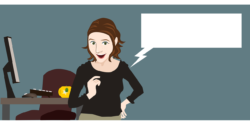 mispronounced. I gave a few examples in my blog post of a couple of weeks ago.
mispronounced. I gave a few examples in my blog post of a couple of weeks ago.
I have decided to make this a series of a few posts, spread out so you won’t get bored! Here are some words beginning with the letters A through E that are often mispronounced.
acrost–should be across (no t at the end)
affidavid – should be affidavit (ends in a t; no David there)
Antartic or Anartic – should be Antarctic (two ts and a c)
barbituate – should be barbiturate (I don’t say this one often, but when I do, I say it incorrectly. There is an r beginning that final syllable.)
calvary – should be cavalry (the l doesn’t become before the v)
cannidate – should be candidate (two ds)
dialate – should be dilate (two syllables, not three)
excape – should be escape (no x)
excetera – should be et cetera (like in escape, there is no x)
expresso – should be espresso (there is no x here either)
Grammar Diva News Update
This coming Saturday, February 25, I will be speaking at the monthly meeting of Marin Writers. 2 p.m., The Book Passage in Corte Madera, CA. It is open to anyone who would like to attend as a guest (or join!)
On Friday evening, March 16 at 7 p.m., I will be launching The Best Little Grammar Collection Ever! at Copperfield’s Books in Petaluma. There will be refreshments and a lively talk about language. Hope to see you there if you are in the area!
February 2, 2018
Talking Tips: Ten Things You Don’t Want to Say!
Many times we talk about grammar in terms of writing. This blog post is about speaking. We don’t need to worry about punctuation when we speak, but we do have to worry about  grammar—and pronunciation (which we don’t have to worry about when we write).
grammar—and pronunciation (which we don’t have to worry about when we write).
Here are ten of the most common speaking gaffes:
Using a pronoun directly after the noun it refers to: My brother he is visiting from Boston. Please take out he. My brother is visiting from Boston.
I don’t is correct. But he don’t, she don’t, and it don’t are not! It’s doesn’t.
Please don’t get your past participles wrong. The English language is tricky, with so many irregular verbs, but please try to learn them. It isn’t have/has went. Ever!!! It is has/have gone. Likewise, it is have written (not wrote), have eaten (not ate), have spoken (not spoke), have fallen (not fell), have rung (not rang), have swum (not swam)….and there are others.
Mischievous is spelled that way because that is the way it is pronounced. It is not spelled mischeevious, and it is not pronounced that way either. The accent is on the first syllable, and there is no i in the final syllable.
Width ends in a -th. Height ends in a -t. It is not heighth.
Oh, please don’t say ain’t. Yes, it is in the dictionary, but so is irregardless.
This is probably a dialect issue, but please don’t drop your -ing endings to be -in endings. I am going, not goin’.
Many of the grocery stores have now gotten less and fewer correct, so you should too. Less is used for singular nouns and things that cannot be counted. Fewer is used for plurals and things that can be counted: Less money. Fewer pennies. Less salt. Fewer teaspoons of salt. Less stuff. Fewer than 12 items. The same is true of number and amount. Number is used with plurals. Amount is used for singulars and things that can’t be counted. Number of pennies. Amount of money. Number of doughnuts. Amount of pastry.
Avoid using double negatives. Most of us avoid things like I don’t have no money, but remember that barely, scarcely and hardly are also negatives. I don’t barely have enough money is a double negative. I can’t hardly stand it is a double negative. You haven’t scarcely eaten a thing is a double negative.
Realtor and jewelry are often mispronounced. They are usually pronounced with three syllables, but they each have only two. It is not jew-la-ry. It is jewel-ry. It is not re-la-tor. It is real-tor.
And while we are on the subject, please put that first R in February!
Grammar Diva News
Launch Event for The Best Little Grammar Collection Ever! Copperfield’s Books in Petaluma, CA: Friday, March 16 at 7 p.m.
My two new books are available….
January 26, 2018
My Writing Life
A while ago, one of my readers asked me to write a post about my life as a self-publisher. However, before I became a self-publisher (or “indie” publisher, as we like to call it), I was a 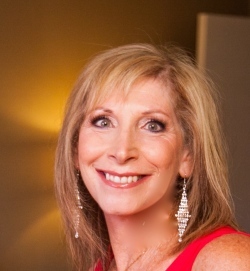 writer for a very long time. I think most people who write have been writing for most of their lives. So, I thought I would trace my writing life before my self-publishing experience. You can see whose posts you have been reading all this time! For those of you who would prefer me to stick with grammar (and I know you exist), I will be back to grammar next week. And the second, and final, installment of my writing and self-publishing life will be sometime at the end of February.
writer for a very long time. I think most people who write have been writing for most of their lives. So, I thought I would trace my writing life before my self-publishing experience. You can see whose posts you have been reading all this time! For those of you who would prefer me to stick with grammar (and I know you exist), I will be back to grammar next week. And the second, and final, installment of my writing and self-publishing life will be sometime at the end of February.
The earliest recollection I have of writing goes back to when I was about six or seven. I wrote a holiday musical called Babes in Toyland (original, huh?) for my friends and me to perform for our moms. I remember it ending badly after I had some type of artistic ownership snit.
I then started writing poetry, probably some time during elementary school. I still have a “book” (actually, a notebook) of my poems complete with illustrations I did. I am thinking of publishing the poems I wrote as a young girl and teenager. I will have to give them another look!
Like most preteen girls, I became very interested in pop music. Pop music in the 60s was very different from pop music of today. There were some popular music radio stations that played top 40, there were vinyl 33s and 45s, and that was about it. No Pandora, iTunes, Spotify, no zillions of sub genres of pop music. Everyone listened to pretty much the same radio stations and music. I became a fan of some groups at the time and started writing song lyrics. I am sure by the time I was at the end of high school, I had written well over a hundred songs. I generally had to have a melody in my head when I wrote the lyrics, and I knew enough music from my piano lessons and limited guitar playing to write the music down — as long as it was in an easy key! I wanted to be a famous songwriter like the teams of Leiber and Stoller, or Bacharach and David, or Weil and Mann (you have to be a certain age to remember these people). I became interested enough in the music business to read Billboard Magazine (and Variety, although it had more showbiz and less music) every week. I would walk from my house downtown two or three miles to Cal’s, the only place around that sold Billboard. And I would walk there every day after school until the Billboard for that week came in.
My life’s ambition, as stated in my high school yearbook, was to become a songwriter. However, I was interested in other things as I finished high school. I wanted to be an actress. My parents said No to acting school. I never really pushed the issue since I never even acted in a high school play. I did have the lead in the 4th grade play — only because I was so shy my teacher wanted to prove to me that I could do it. And I did it. And I will never forget that dear woman, Miss Louise.
When it was time to apply to college, I figured it might be too difficult to make it in the world of songwriting, so I set my sights on writing for Billboard Magazine. Thus, I wanted to go to school in New York City. I got in, got a scholarship (to Barnard), and finally decided to decline it and go to school in Boston, closer to home. My parents were not happy about my going to college in New York City (too dangerous); I probably shouldn’t have listened. Even though I like the way my life turned out as far as my children, I wonder what I would have become if I had gone to Barnard and majored in English. Would I have become a novelist?
I went to school in Boston and majored in print media. I graduated and then couldn’t find a relavant job. I was looking for something in corporate marketing writing. I dabbled in clerical jobs for a while and then moved to Florida with my then-boyfriend. I ended up getting a job as a newspaper reporter in a small town. I didn’t really like it. I had to look for things to write about, and the things I was assigned to were boring — town meetings, school committee. Today, I would have run away from that town in a flash because of its politics, but, hey, I was just a kid.
After a few months as a reporter, I found a job at the other newspaper in town as a UPI (United Press International) editor, which meant I assembled the two or three pages of state, national, and international news that came of the “wire.” The rest of the paper was local news. I was completely in charge of those pages and could choose whatever news I wanted the readers to see. I wrote the headlines and supervised the pasteup (yes, pasteup). This is before computers. I loved that job because I felt very powerful and in charge.
However, five months later, I needed to return home to Boston, so I left that job, which was probably my favorite job ever besides raising my kids and writing books.
Again, I dabbled in clerical stuff and resumed the dancing I had started as a child. I took jazz classes three or four days a week and worked early in the morning as a medical transcriber.
Enter the computer age! I knew people who were working at computer companies, and I got a job at one of the big companies. I was basically a secretary, and when they were looking to add an editor to the department, I asked for that job. My boss told me he was looking for “a male nerd who just wanted to sit alone in a room and edit.” After I threatened to sue him, I packed up and took a job at another computer company as a technical writer. Finally, a real job! I was a technical writer for a couple of years. Then I switched to editing because I wasn’t interested in the technical information as much as I was interested in the language. Then, I because the supervisor of the editing group. After about seven years I left to raise a family. I stayed home for ten years, although I did some freelance editing, both at home and onsite at a computer company.
After ten years I took a contract job as an editor in the technical writing department of a local telecommunications company where my husband worked. I worked around my kids’ school schedules. By this time, the family had moved from the East Coast to the West.
The telecom industry that was booming when we moved to the West Coast in 1993 was fading by about 2000. I lasted longer than a lot of the direct employees. I guess, as a contractor, they couldn’t find me. I was finally let go in 2001. Also recently divorced, I needed to find something to do. I thought my technical writing skills were probably too old, and I really didn’t want to do that anyway. A couple of friends suggested I become an English teacher. Kicking and screaming all the way . . .
I received a teaching credential at a ripe old age — in 2003 — and got a job teaching 7th grade English. It really wasn’t for me. The teaching was fine, but I did lack classroom management skills! And it was such hard work!
I began to notice that my students made the same grammar, punctuation, and writing mistakes that the writers made when I was an editor. I had always wanted to write a book and had started one, a diet book! I also always wanted to write a book about only children, which I am and which I never did. Yet.
I remember I was at my gym a few years after I began teaching. I was talking to the woman at the front desk, who was a novelist. I told her I was going to write a book with the most common grammar and punctuation mistakes—a small grammar book. (The Best Little Grammar Book Ever!)
And the rest is herstory. And you will hear about it in Part II —some time in February.
Grammar Diva News
Now available on Amazon, Kindle, Barnes and Noble, Nook, Kobo, iBooks and More!
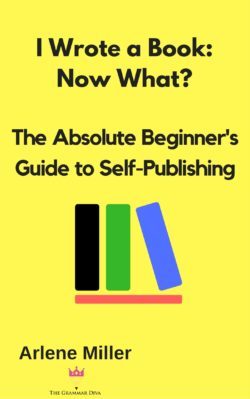 Buy on Kindle
Buy on KindleJanuary 19, 2018
Ten Rules for Writing Numbers
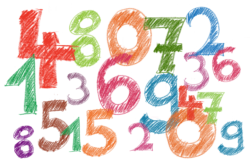 Which numbers are spelled out and which are written as numerals? It depends on the type of writing you are doing. Here are some basic rules for writing numbers:
Which numbers are spelled out and which are written as numerals? It depends on the type of writing you are doing. Here are some basic rules for writing numbers:
1.In scientific or technical writing, spell out numbers one through nine, and use numerals for numbers 10 and higher. However, in literary writing — or writing in the humanities — spell out numbers through ninety-nine. And remember that twenty-one through ninety-nine are hyphenated when they are two words.
2. In charts, figures, and tables, it if fine to use numerals for all your numbers. In fact, it is preferable and looks much better.
3. Never begin a sentence with a numeral. Write out the number or rewrite the sentence so the number doesn’t appear at the beginning.
One hundred members of the band marched down the street.
We watched as 100 members of the band marched down the street.
4. If you have a sentence with two numbers that refer to similar things, or the same thing, either write them both out or use numerals for both. It doesn’t matter what the numbers are.
We counted 9 boys and 112 girls at the girls’ softball game.
I made 6 dozen cookies and 150 cupcakes.
5. Spell out very large numbers instead of using a series of zeroes — even in a chart or table.
The population of my city is nearly 2 million now OR
The population of my city is nearly two million now.
6. Dimensions, sizes and exact temperatures should be expressed in numerals.
The weather forecast calls for a high of 20 degrees tonight.
She wears a size 10 dress.
7. Always use numerals along with a.m. or p.m.
Let’s meet at 7:30 a.m. tomorrow.
8. With the word o’clock you can use either numerals or words.
The meeting is at two o’clock.
The meeting is at 2 o’clock.
9. Hyphenate fractions like two-thirds when spelling them out. Apply the same usage rules to fractions as other numbers.
10. Do not use firstly, secondly, and thirdly as transition words. Use first, second, and third.
—————————————————————————————————————————————————————————————-
Yay! Now available on Amazon, Kindle, and other online stores.
Come to the book launch at Copperfield’s Books in Petaluma, CA: Friday, March 16 at 7 p.m.
Yay! Now available on Kindle and other e-readers.

January 11, 2018
The Grammar Quiz: Explanation Time
Last week I posted this 25-question grammar quiz. This week, as promised, I will give longer explanations for the answers that required them, so here goes. 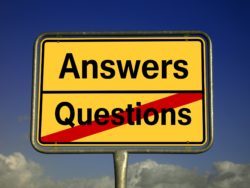 Incidentally, some readers already commented on some of these things, so thank you!
Incidentally, some readers already commented on some of these things, so thank you!
1. Is this book title capitalized correctly? And We are Happy Again
No. Are needs to be capitalized as well. It may be small, but it is a verb. Is, Am, Be, and other short verbs also need to be capitalized in a title. The only words not capitalized in titles are conjunctions like and and but, articles (a, and, and the), and short prepositions of four letters or fewer (for, by, to, at, etc.)
2. My mom gave snacks to my friend and (me, myself, I).
Me. The easiest thing to do is, of course, take out “my friend.” The mom gave snacks to me. Grammatically speaking, me is an object verb, and I is a subject verb. Here you need an object. Myself is used for emphasis: I myself baked the wedding cake. OR I baked the wedding cake myself. Generally, when you use myself, the subject of the sentence should be I.
3. Is something wrong with this sentence? If so, what? I heard about the meeting at the zoo.
The sentence is unclear. Was the meeting at the zoo? It sounds like it because at the zoo is right next to meeting, and in the English language words are assumed to go with words they are near. You probably heard about the meeting while you were at the zoo. So, it is best to rewrite: At the zoo, I heard about the meeting. OR While I was at the zoo, I heard about the meeting.
4. Is something wrong with this sentence? If so, what? Topics covered during the seminar will include ordering new equipment, training employees on the new software, who will be the system administrator, and assigning tasks for maintaining the new lab.
The sentence is not parallel. Similar things in a sentence should have similar structure. Here is the series made parallel: ordering new equipment, training employees on the new software, deciding who will be system administrator, and assigning tasks for maintaining the new lab.
5. Is this sentence okay? And we will have all the new furniture in time for our open house!
The sentence is okay. We used to say we couldn’t begin a sentence with a conjunction like and, but or so. It is acceptable, mostly in conversational or informal writing.
6. Is this sentence okay? The teacher told us we couldn’t leave our desks until the bell had rang.
Wrong. It should be had rung. Ring is an irregular verb whose forms are ring, rang, has or had or have rung.
7. (Who, whom) did you invite to the movies?
It is said that the differentiation between who and whom will soon be gone. However, if you want to be correct, the answer is whom. Who is the subject form, and whom is the object form. Turn the sentence around to make it a statement: You did invite whom to the movies. Similarly, you would say, You did invite him to the movies.
8. This is the closing of a letter: Sincerely (Yours, yours)
yours. Only the first word of a letter closing is initial capped.
9. Is this sentence okay? I don’t know whom I am going with.
Correct. Whom is the object of the preposition with. I don’t know with whom I am going. However, it is now okay to end a sentence with a preposition like with. But it is still not okay to say,“Where are you at?”
10. Can you identify the grammar issue in this sentence? He told me to carefully tear the coupons.
Split infinitive. The infinitive is to tear (to and a verb). It is split by the adverb carefully. It is fine to split an infinitive. It used to be considered wrong.
11. Is this sentence okay? Why or why not? Joe and his friend tried to climb Mt. Whitney, but he was too out of shape.
Unclear sentence. Who was out of shape? We can’t tell if it was Joe or his friend. Rewrite. Joe and his friend tried to climb Mt. Whitney, but Joe was too out of shape. Or his friend was. Or they both were!
12. What is the problem with this sentence? The meeting is at 8 a.m. in the morning.
Redundant. You don’t need both a.m. and in the morning. They mean the same thing.
13. How would you fix this sentence? The coat, that has a blue hood, is mine.
Remove the commas. The clause that has a blue hood is probably necessary to the sentence to identify which coat you are talking about. If, in the context of the writing, is is not necessary, leave the commas, but change that to which.
14. Between you and (I, me), I think he gave the tickets to (he, him) and Joe.
Between you and me is always correct. Me is an object pronoun, and you and me are objects of the preposition between. He gave the tickets to him; you wouldn’t say He gave the tickets to he.
15. Neither Carrie nor Katrina (are, is) playing in the concert.
The answer is is. When you use neither or either you use the singular verb.
16. I feel really (bad, badly) about missing the meeting.
The answer is bad. Feel is an emotion here, not the action of touching something, so we use the adjective. I feel badly means that your fingertips are not working right.
17. Everyone who is going to the concert needs to bring (his or her, their) ticket.
Everyone is singular, and the verb is is singular. Therefore the pronoun should also be singular: he or she. People have decided that is awkward, and now you can use they as a singular pronoun. I don’t like it, and I won’t do it. You decide.
18. My cat is (laying, lying) in the sun.
Lying. You need to lay something: it needs an object. My cat is laying the toy on the chair.
19. My sister, along with her friends, (are, is) coming with us.
The answer is is. Along with her friends doesn’t count. It is not part of the subject. The subject is my sister, which is singular. If you change it to My sister and her friends, then it is plural.
20. If I (was, were) taller, I could reach that bookshelf.
Were is the correct verb here. It is called subjunctive mood and is used for things that are not true and things that you wish.
21. Is this sentence correct? The class consists of nine boys and 16 girls.
The numbers should be expressed similarly, since they name pretty much the same thing. You can spell out both nine and sixteen, or you can use 9 and 16, but make them consistent.
22, Is this sentence correct? Drive slow through the fog.
Slowly would be better. Slow is an adjective, and slowly is an adverb. The word is modifying drive (drive how?), so you should use an adverb. Sometimes we leave off the -ly; it is called a flat adverb. Flat adverbs used to be used more than they are now. I would stick with slowly.
23. She likes chocolate better than (I, me).
The answer could be either depending on your meaning. The answer is probably I. You need to supply the missing words to know: She likes chocolate better than I (do). Or She likes chocolate better than (she likes) me.
24. Is this sentence correct? Sitting on a bed of rice, the chicken looked delicious.
Yes. It is the chicken that is sitting on the bed of rice, so the sentence is correct. This, however, is not: Sitting on a bed of rice, I thought the chicken looked delicious.
25. It is (they, them) knocking at the door.
Technically, the answer is they, but it does sound a little stuffy, so people might say them. After a verb of being like is, we use the subject form of the pronoun, which is they. And think about it. When you answer the phone and someone asks for you, you might say, This is she or This is he, rather than This is her or This is him.
Grammar Diva News!
Available now on Amazon! (and soon from other retailers)
Available now on Nook
Available now on Kobo
Coming Events!!!!!!!!!!
Sunday, February 25, 2 p.m., featured speaker at Marin Writers, Book Passage, Corte Madera (guests welcome)
Friday, March 16, Official Book Launch for The Best Little Grammar Collection Ever!, Copperfield’s Books, Petaluma (everyone welcome!)
Saturday, April 21, 8-5, Grammar and Self-Publishing Coach, Pen to Published, Redwood Writers Conference, Finley Center, Santa Rosa (register for the conference at RedwoodWriters.org)

